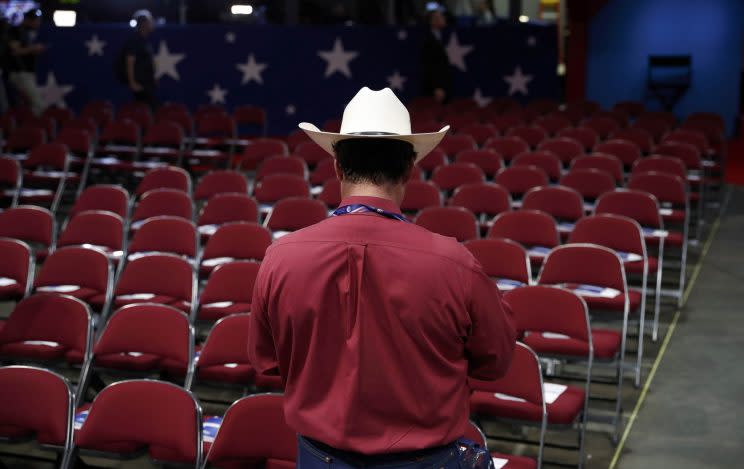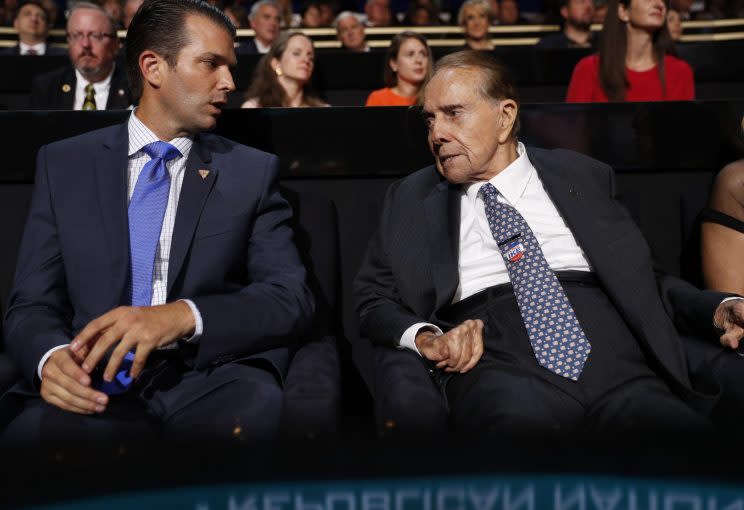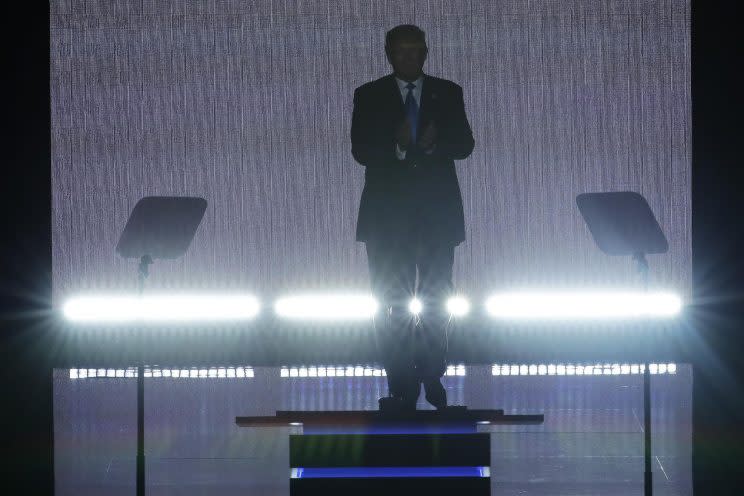The Cleveland convention is ratifying the GOP’s loss of party power

CLEVELAND — One of the last real levers of power that political parties hold in their hands in America is the nominating convention.
And the Republican Party this week used that instrument of power — which it controls almost completely — to push over the finish line the nomination of a presidential candidate whose ascendancy demonstrates how weak and ineffectual the party itself has become this election year.
Throughout American history, political parties have used their power to exercise quality control over the nominating process. By acting as private clubs, they have prevented extremists and fringe characters from gaining power.
At conventions, the party still reigns supreme. It can stick rebellious state delegations in remote hotels and far corners of the convention hall, complicating their logistics and making it harder for them to participate in floor proceedings. But this is only a shadow of the power parties once held across all parts of the presidential nominating process.
Before 1972, this meant presidential nominees were picked by party bosses at the convention. The bosses controlled blocs of delegates, and met in back rooms to decide who had the broadest appeal to the nation, with the best chance of winning the general election in the fall.
Their choice then stood before the voters in about as close a form of direct democracy as you can get. The presidential-selection process was a mixed system: closed and top-down before the nominee was selected, but open and bottom-up after that. The argument for this approach lay in the American founders’ determination to prevent too much power from being concentrated in the hands of any one person or group of persons, while also preventing the “passions” of the will of the voters — or as Donald Trump often refers to it, the “will of the people” — from running roughshod over the ability of leaders to think and act deliberatively.
After reforms ahead of the 1972 election, however, the primary process began to take precedence over the convention, as voters began to expect more input in the party primaries, at the expense of party bosses and delegates. Television played a big role in this, opening up the convention process to people who weren’t there. The parties have tried to push back at times, with some success. The Democrats created superdelegates ahead of the 1984 election, to allow party insiders to moderate and temper the energy from the grass roots. But cultural attitudes have continued to trend against party control and have shaped the process.
And that is why the RNC staff and committee members have worked to help Trump. They know that the public is conditioned to think of primary elections as determinative, even though the delegate system is supposed to serve as a buffer or release valve for the party in the case of an inconclusive result.
Many Republicans also believe that maintaining party unity this year is crucial to surviving what they hope is a Trump loss. “He’s not a Republican. He’s renting the party for a little while, and nobody knows what happens to the party afterwards, presuming he loses,” said a highly placed Republican congressional aide.
Since 1972, the parties have further lost power through the movement of political money away from them and toward outside groups and individuals, thanks to the McCain-Feingold legislation in 2002 and the Supreme Court’s Citizen’s United decision in 2010. In Congress, the parties have also lost the ability to corral their respective members through tools like earmarks and party fundraising. That’s led some to argue that it’s time to empower political parties again.

To understand the linkage between the diminution of party power in Congress and the presidential cycle, consider the example of Sen. Ted Cruz , R-Texas, who has based his entire career around thumbing his nose at the party leaders and has rocketed to stardom as a result, using television, social media, buckets of cash from both deep-pocketed donors and $5 donations from grass-roots activists and Fox News viewers.
Politicians like Cruz, and like Sen. Bernie Sanders — an Independent who ran as a Democrat for president — play to the purist extremes of right and left. And because they fear neither the loss of party resources nor the loss of a committee position or earmarks in Congress, there are no incentives to move to the middle and lead their followers toward compromise in governance or in rhetoric.
I’ve written over the last few years about the Republican National Committee’s fights with the Koch brothers over who controls massive amounts of data about the nation’s voters. The argument in the RNC’s favor is that it is a group with a history, and a set of beliefs, with checks and balances inherent in how it operates, that makes it a better steward than a privately held corporation.
Meanwhile conventions, those relics of the past, have remained fully under party control. Many of the tools that parties use to exert power at a convention, however, are far more obscure and subtle than the smoke-filled rooms that used to determine who the nominee would be.
The RNC controls the entire process, from who stays in which hotel to where each state sits on the floor to the schedule on the floor. And in the case of a fight over the rules like the one that took place over the past few days, those seemingly innocuous details play a big role. Your days are much longer, and more complicated, if you are Sen. Mike Lee, R-Utah, and your state’s delegation is 45 minutes away from downtown Cleveland in Akron.
Any attempt to exercise influence through a party committee or a convention require familiarity with byzantine rules and strict rules of parliamentary procedure. That’s another hurdle.

And then the RNC’s control of the chairman’s gavel in the convention rules committee last week enabled party leaders to stall for time when they needed five hours on Thursday morning to wrangle votes and pressure committee members to vote against an insurgent-led package of rules changes. By the same token, the decision to hold the crucial vote on whether to unbind the delegates late on Thursday night was a coordinated move among the pro-Trump members of the committee.
On the convention floor Monday, the RNC again stalled for time as leaders whipped votes, and began the process of deciding whether to hold a roll call vote on the rules package only when they had pressured or persuaded enough delegates to reverse their support.
The RNC was helped by the fact that it had a team of whips who had worked previous conventions and a crew of experienced political operatives working behind the scenes, coordinating with each other, the Trump campaign and their supporters in the state delegations.
Meanwhile, the states that wanted to vote for a roll call vote against the wishes of the RNC were mostly in the back of the hall. That made it harder for them to be heard by the chairman on the stage, and to be recognized to call for a roll call vote.
Only the fact that the hall was filled with roars of protest from those who wanted the roll call vote forced the chairman, Rep. Steve Womack of Arkansas, to recognize the state delegation chair from Utah.
And then the chair simply announced that enough states had withdrawn their support to deprive the effort for a vote of the minimum seven states required to force the vote.

In 1972, political journalist David Broder wrote in his book “The Party’s Over” that “things have been happening in this country that I would not have believed when I came to Washington sixteen years and four Presidents ago.”
“I have seen a President and his brother, a presidential candidate, murdered by assassins. I have seen the Capitol of the United States blasted by explosives on one occasion, and ringed by arson fires on another,” Broder wrote.
Broder cautioned that in such a chaotic environment, “when frustration reaches the breaking point, when inflation and economic uncertainty, work stoppages, civil disturbances, crime, drugs, and the breakdown of public services can no longer be tolerated, a different sort of man with a different solution may present himself. A plausible demagogue may appear and say, ‘Give me power and I will make things work again. I will restore order to your lives. I will see that there is discipline again.’”
Broder finished with an appeal to restore power to the political parties to make government work again, to guard against such a demagogue.
“I believe that we have the instrument at hand, in the party system, that can break the long and costly impasse in our government. But it is up to us to decide whether to use it,” Broder wrote.
Since then, Americans have decidedly not followed Broder’s advice. And as this week’s convention shows, the party system is weaker than it’s ever been.
_____
Related slideshows:
On the ground at the RNC Convention – A photo report >>>
Melania Trump in the convention spotlight >>>
Convention floor erupts when no roll call taken to change rules to unbind delegates >>>
Demonstrators protest outside the RNC >>>


